张汉熙高级英语第二册讲义3
- 格式:doc
- 大小:693.50 KB
- 文档页数:35
![[精华版]张汉熙高级英语课文详解第2册1-5课](https://uimg.taocdn.com/73319e44b7360b4c2f3f641a.webp)
[精华版]张汉熙高级英语课文详解第2册1-5课Lesson OnePart One: paragraph 1 --- paragraph 6sh: v. to move quickly or violently 猛烈冲击、猛打(1) 暴风雨袭击了海岸的那片树林。
Rainstorm lashed the forest on the coast.(2) 冰雹无情地打下来。
Hail lashed down mercilessly.(3) The waves are lashing the shore.(4) A rising wind was lashing the rain against the window.2.pummel/ pommel: n.v. to beat or hit with repeated blows, esp. with the fist 用拳头连续敲打(1) The thief was pushed and pummeled by an angry crowd.(2) 他诱骗那人到角落狠狠揍了他30秒钟。
He trapped the man in a corner and pummeled him ferociously for thirty seconds.3. Louisiana, Mississippi and Alabama4. California, Las Vegas5. consult: go to a person or book for informationconsult sb.: ask sb. for special information, adviceconsult with sb.: to exchange opinions of sb.6. Hurricane Betsy:a powerful Hurricane of the 1965 Atlantic Hurricane season which caused enormous damage inthe Bahamas, Florida, and Louisiana.7. A good: at least, full(1) 我们足足等了三个小时. We waited for a good three hours.(2) 昨晚Bill在酒馆里喝得烂醉. Bill had a good drink at the pub last night.(3) It is a good five hours to drive to the railway station.(4) His parents gave him a good beating.8. We can batten down and ride it out.A metaphor: compare the house in a hurricane to a ship fighting a storm at seaWe can make the necessary preparations and survive the hurricane without much damage.9. Batten: to fasten with battens 用压条钉住(或固定)10. Ride it out: to stay afloat during a storm without much damage.11. Scud: (of clouds or ships) to move swiftly, glide or skim along easily 疾行、飞驰、掠过(1) The ship scuds before the wind.(2) White clouds scudded across the sky.12. Vietnam(1) A country of southeast Asia (2) Capital: Hanoi (3) The largest city: Ho Chi Minh City (4)Population: 84,400,000 (5) the Red River (6) the Mekong River Delta 13. Sit out:(1) It’s hot indoors. Let’s sit out in the garden.sit sth. out: a. to stay to the end of a performanceb. take no part in (esp. a particular dance) (2) The play was boring, but we sat it out.(3) I think I will sit out the next dance.Part Two: paragraph 7 --- paragraph 271. French door: two adjoining doors that have glass panes from topto bottom and they open inthe middleto throw away; (fig.) to do sth. with a lot of enthusiasm and energy.2. Fling: to throw violently ;(1) She flung her shoe at the cat.(2) The youth got him by the front of his shirt and flung him to the ground. (3) How can you fling your wife away?(4) He has flung up studies.(5) She flung herself into her career.3. shove: push with quick, violent movement. 猛推(1)人们推推搡搡挤向火车。
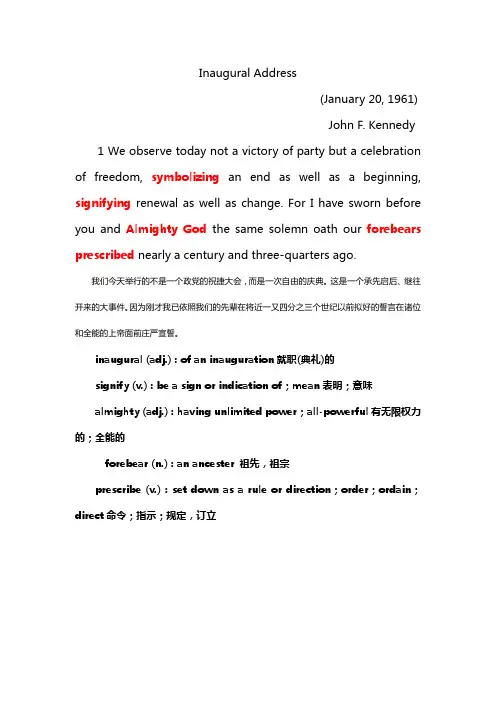
Inaugural Address(January 20, 1961)John F. Kennedy1 We observe today not a victory of party but a celebration of freedom, symbolizing an end as well as a beginning, signifying renewal as well as change. For I have sworn before you and Almighty God the same solemn oath our forebears prescribed nearly a century and three-quarters ago.我们今天举行的不是一个政党的祝捷大会,而是一次自由的庆典。
这是一个承先启后、继往开来的大事件。
因为刚才我已依照我们的先辈在将近一又四分之三个世纪以前拟好的誓言在诸位和全能的上帝面前庄严宣誓。
inaugural (adj.) : of an inauguration就职(典礼)的signify (v.) : be a sign or indication of;mean表明;意味almighty (adj.) : having unlimited power;all-powerful有无限权力的;全能的forebear (n.) : an ancester 祖先,祖宗prescribe (v.) : set down as a rule or direction;order;ordain;direct命令;指示;规定,订立2 The world is very different now. For man holds in his mortal hands the power to abolish all forms of human poverty and all forms of human life. And yet the same revolutionary belief for which our forebears fought is still at issue around the globe, the belief that the rights of man come not from the generosity of the state but from the hand of God.当今的世界已与往昔大不相同了。
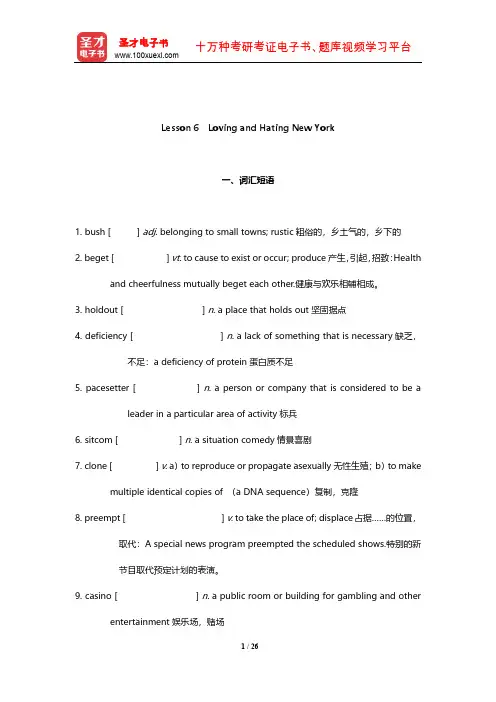
Lesson 6 Loving and Hating New York一、词汇短语1. bush [] adj. belonging to small towns; rustic粗俗的,乡土气的,乡下的2. beget [] vt. to cause to exist or occur; produce产生,引起,招致:Healthand cheerfulness mutually beget each other.健康与欢乐相辅相成。
3. holdout [] n. a place that holds out坚固据点4. deficiency [] n. a lack of something that is necessary缺乏,不足:a deficiency of protein蛋白质不足5. pacesetter [] n. a person or company that is considered to be aleader in a particular area of activity标兵6. sitcom [] n. a situation comedy情景喜剧7. clone [] v. a)to reproduce or propagate asexually无性生殖;b)to makemultiple identical copies of (a DNA sequence)复制,克隆8. preempt [] v. to take the place of; displace占据……的位置,取代:A special news program preempted the scheduled shows.特别的新节目取代预定计划的表演。
9. casino [] n. a public room or building for gambling and otherentertainment娱乐场,赌场10. nightspot [] n. nightclub夜总会11. superdome []n. a large dome-shaped structure, especially a sports stadium超级穹顶12. bilk [] vt. to defraud, cheat, or swindle蒙骗,欺骗:He made millions bybilking wealthy clients on art sales.他在艺术品销售中骗取富有顾客的大量钱财。
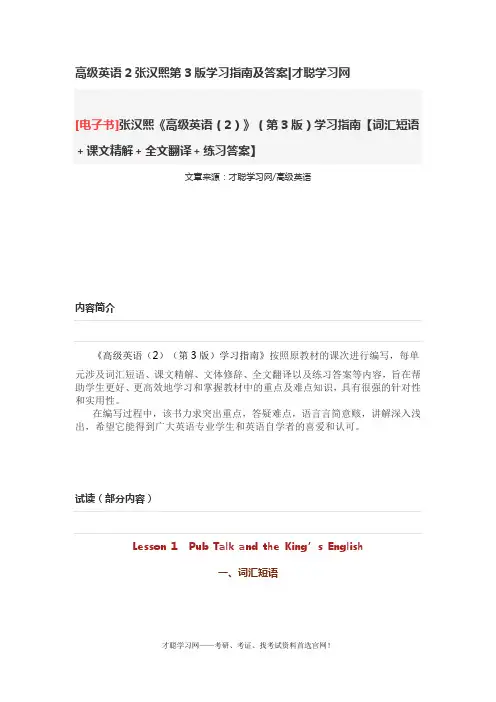
高级英语2张汉熙第3版学习指南及答案|才聪学习网[电子书]张汉熙《高级英语(2)》(第3版)学习指南【词汇短语+课文精解+全文翻译+练习答案】文章来源:才聪学习网/高级英语内容简介《高级英语(2)(第3版)学习指南》按照原教材的课次进行编写,每单元涉及词汇短语、课文精解、文体修辞、全文翻译以及练习答案等内容,旨在帮助学生更好、更高效地学习和掌握教材中的重点及难点知识,具有很强的针对性和实用性。
在编写过程中,该书力求突出重点,答疑难点,语言言简意赅,讲解深入浅出,希望它能得到广大英语专业学生和英语自学者的喜爱和认可。
试读(部分内容)Lesson 1 Pub Talk and the King’s English一、词汇短语1.intricate [5intrikit] adj. complex; solvable or comprehensible only wit h painstaking effort错综复杂的;难懂的,难以解决的:an intricate desig n难懂的设计2.indulge [in5dQldV] vt. to yield to the desires and whims of, especial ly to an excessive degree沉迷,放纵,纵情享受:indulge oneself in ea ting and drinking纵情于吃喝。
与其构成的短语有:indulge in沉溺于;饱享3.meander [mi5AndE] vi. to move aimlessly and idly without fixed dir ection漫游,闲逛:We usually meander down to the pub after the di nner.晚饭之后,我们常常漫步去酒吧。
4.conversationalist [7kCnvE5seiFEnElist] n. one given to or skilled at co nversation健谈者:He is even-tempered, easy-going and an excellent conversationalist.他是处事不惊的,待人随和,同时也是个非常健谈的人。
![[精华版]张汉熙高级英语课文详解第2册1-5课](https://uimg.taocdn.com/73319e44b7360b4c2f3f641a.webp)
[精华版]张汉熙高级英语课文详解第2册1-5课Lesson OnePart One: paragraph 1 --- paragraph 6sh: v. to move quickly or violently 猛烈冲击、猛打(1) 暴风雨袭击了海岸的那片树林。
Rainstorm lashed the forest on the coast.(2) 冰雹无情地打下来。
Hail lashed down mercilessly.(3) The waves are lashing the shore.(4) A rising wind was lashing the rain against the window.2.pummel/ pommel: n.v. to beat or hit with repeated blows, esp. with the fist 用拳头连续敲打(1) The thief was pushed and pummeled by an angry crowd.(2) 他诱骗那人到角落狠狠揍了他30秒钟。
He trapped the man in a corner and pummeled him ferociously for thirty seconds.3. Louisiana, Mississippi and Alabama4. California, Las Vegas5. consult: go to a person or book for informationconsult sb.: ask sb. for special information, adviceconsult with sb.: to exchange opinions of sb.6. Hurricane Betsy:a powerful Hurricane of the 1965 Atlantic Hurricane season which caused enormous damage inthe Bahamas, Florida, and Louisiana.7. A good: at least, full(1) 我们足足等了三个小时. We waited for a good three hours.(2) 昨晚Bill在酒馆里喝得烂醉. Bill had a good drink at the pub last night.(3) It is a good five hours to drive to the railway station.(4) His parents gave him a good beating.8. We can batten down and ride it out.A metaphor: compare the house in a hurricane to a ship fighting a storm at seaWe can make the necessary preparations and survive the hurricane without much damage.9. Batten: to fasten with battens 用压条钉住(或固定)10. Ride it out: to stay afloat during a storm without much damage.11. Scud: (of clouds or ships) to move swiftly, glide or skim along easily 疾行、飞驰、掠过(1) The ship scuds before the wind.(2) White clouds scudded across the sky.12. Vietnam(1) A country of southeast Asia (2) Capital: Hanoi (3) The largest city: Ho Chi Minh City (4)Population: 84,400,000 (5) the Red River (6) the Mekong River Delta 13. Sit out:(1) It’s hot indoors. Let’s sit out in the garden.sit sth. out: a. to stay to the end of a performanceb. take no part in (esp. a particular dance) (2) The play was boring, but we sat it out.(3) I think I will sit out the next dance.Part Two: paragraph 7 --- paragraph 271. French door: two adjoining doors that have glass panes from topto bottom and they open inthe middleto throw away; (fig.) to do sth. with a lot of enthusiasm and energy.2. Fling: to throw violently ;(1) She flung her shoe at the cat.(2) The youth got him by the front of his shirt and flung him to the ground. (3) How can you fling your wife away?(4) He has flung up studies.(5) She flung herself into her career.3. shove: push with quick, violent movement. 猛推(1)人们推推搡搡挤向火车。
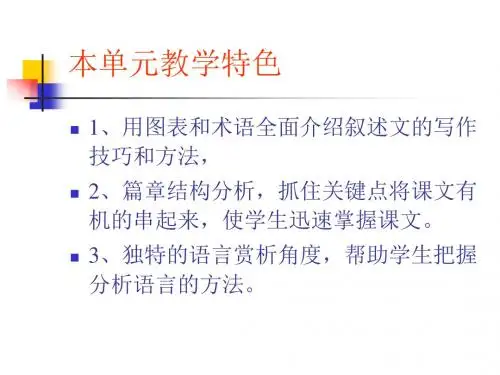
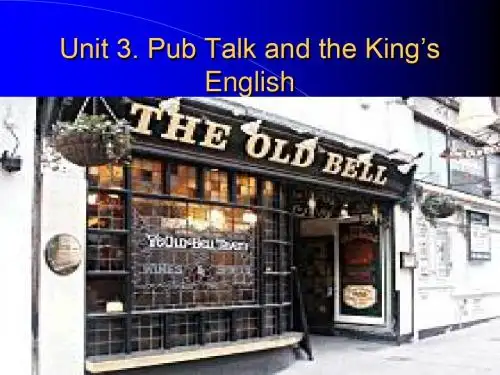
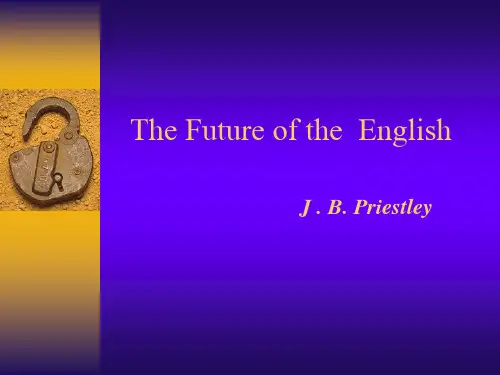
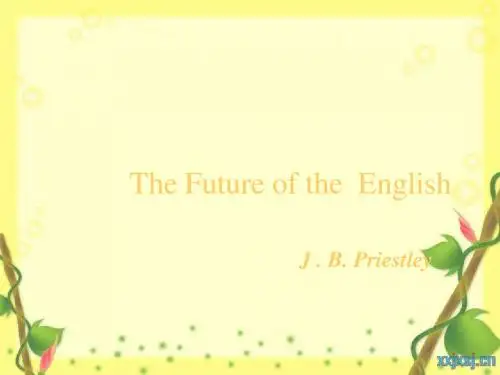
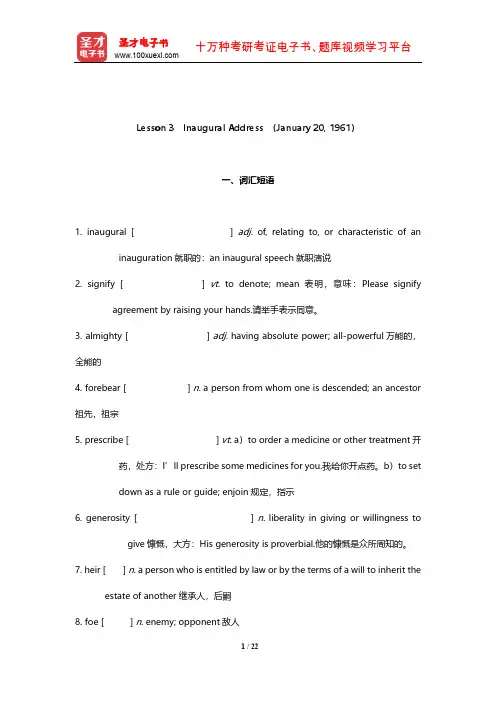
Lesson 3 Inaugural Address (January 20, 1961)一、词汇短语1. inaugural []adj. of, relating to, or characteristic of aninauguration就职的:an inaugural speech就职演说2. signify []vt. to denote; mean表明,意味:Please signifyagreement by raising your hands.请举手表示同意。
3. almighty [] adj. having absolute power; all-powerful万能的,全能的4. forebear [] n. a person from whom one is descended; an ancestor 祖先,祖宗5. prescribe [] vt. a)to order a medicine or other treatment开药,处方:I’ll prescribe some medicines for you.我给你开点药。
b)to setdown as a rule or guide; enjoin规定,指示6. generosity []n. liberality in giving or willingness togive慷慨,大方:His generosity is proverbial.他的慷慨是众所周知的。
7. heir [] n. a person who is entitled by law or by the terms of a will to inherit theestate of another继承人,后嗣8. foe [] n. enemy; opponent敌人9. undoing [] n. the act of bringing to ruin毁灭,破坏:Stress can bethe undoing of so many fine players.紧张可能是许多优秀选手失败的原因。
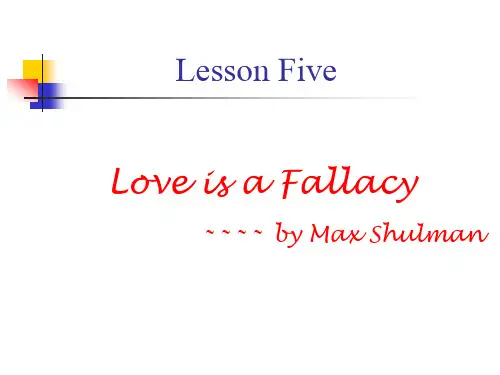
Lesson 1Face to Face with Hurricane Camille1。
We're elevated 23 feet. (para 3)We' re 23 feet above sea level。
2. The place has been here since 1915, and no hurricane has ever bothered it。
(para 3)The house has been here since 1915, and no hurricane has ever caused any damage to it.3。
We can batten down and ride it out. (para 4)We can make the necessary preparations and survive the hurricane without much damage. 4。
The generator was doused, and the lights went out. (para 9)Water got into the generator and put it out。
It stopped producing electricity, so the lights also went out。
5。
Everybody out the back door to the cars! (para 10)Everybody go out through the back door and run to the cars。
6. The electrical systems had been killed by water. (para 11)The electrical systems in the car had been put out by water.7. John watched the water lap at the steps, and felt a crushing guilt。
张汉熙《高级英语(2)》(第3版重排版)学习指南【词汇短语+课文精解+全文翻译+练习答案】目录Lesson 1 Pub Talk and the King’s English 一、词汇短语 二、课文精解 三、文体修辞 四、全文翻译 五、练习答案Lesson 2 Marrakech 一、词汇短语 二、课文精解 三、文体修辞 四、全文翻译 五、练习答案Lesson 3 Inaugural Address (January 20, 1961) 一、词汇短语 二、课文精解 三、文体修辞 四、全文翻译 五、练习答案Lesson 4 Love Is a Fallacy 一、词汇短语 二、课文精解 三、文体修辞 四、全文翻译 五、练习答案Lesson 5 The Sad Young Men 一、词汇短语 二、课文精解 三、文体修辞 四、全文翻译 五、练习答案Lesson 6 Loving and Hating New York 一、词汇短语 二、课文精解 三、文体修辞 四、全文翻译 五、练习答案Lesson 7 The Ones Who Walk Away from Omelas (Excerpts) 一、词汇短语 二、课文精解 三、文体修辞 四、全文翻译 五、练习答案Lesson 8 The Future of the English 一、词汇短语 二、课文精解 三、文体修辞 四、全文翻译 五、练习答案Lesson 9 The Loons 一、词汇短语 二、课文精解 三、文体修辞 四、全文翻译 五、练习答案Lesson 10 The Discovery of What It Means to Be an American 一、词汇短语 二、课文精解 三、文体修辞 四、全文翻译 五、练习答案Lesson 11 Four Laws of Ecology (Part I) 一、词汇短语 二、课文精解 三、文体修辞 四、全文翻译 五、练习答案Lesson 12 Four Laws of Ecology (Part Ⅱ) 一、词汇短语 二、课文精解 三、文体修辞 四、全文翻译 五、练习答案Lesson 13 The Mansion: A Subprime Parable (Excerpts) 一、词汇短语 二、课文精解 三、文体修辞 四、全文翻译 五、练习答案Lesson 14 Faustian Economics 一、词汇短语 二、课文精解 三、文体修辞 四、全文翻译 五、练习答案Lesson 15 Disappearing Through the Skylight 一、词汇短语 二、课文精解 三、文体修辞 四、全文翻译 五、练习答案弘博学习网————各类考试资料全收录内容简介本书是《高级英语(2)》(第3版重排版)的学习辅导用书,按照原教材的课次进行编写,每单元涉及词汇短语、课文精解、单元语法、全文翻译以及练习答案等内容。
词汇(Vocabulary): hard to follow or understand because full of puzzling parts,details,or relationships错综复杂的;难以理解的,难懂的----------------------------------------------------------------------------------: give way to one’s own d esire尽情享受;从事于----------------------------------------------------------------------------------: wander aimlessly or idly;ramble漫步;闲逛----------------------------------------------------------------------------------: a person who converses;esp.,one who enjoys and is skilled at conversation交谈者;(尤指)健谈者----------------------------------------------------------------------------------: a short,entertaining account of some happening,usually personal or biographical轶事,逸事----------------------------------------------------------------------------------: a close friend or companion密友,知己----------------------------------------------------------------------------------: in or into a condition of ruin or catastrophe (婚姻)破坏的;失败的----------------------------------------------------------------------------------: (formerly)a soldier armed with a musket火枪手---------------------------------------------------------------------------------- : investigate for information;search发掘;调查(研究)---------------------------------------------------------------------------------- : a secluded,withdrawn,or inner place幽深处----------------------------------------------------------------------------------: aimlessly;at random随意地;无目的地----------------------------------------------------------------------------------: an early form of chemistry,whose chief aims were to change baser metals into gold:a method or power of transmutation; esp. the seemingly miraculous change of a thing into something better炼金术;变化物质的方法或魔力---------------------------------------------------------------------------------- : sharp in taste;sour;acid辛辣的;尖酸的;刻薄的----------------------------------------------------------------------------------: a person found guilty of a crime and sentenced by a court罪犯---------------------------------------------------------------------------------- : a farm laborer;peasant农民;庄稼人,乡下人---------------------------------------------------------------------------------- : an open break in a previously friendly relationship分裂;失和----------------------------------------------------------------------------------: run or go hurriedly or quickly急驰,快跑----------------------------------------------------------------------------------: a translation翻译----------------------------------------------------------------------------------: of,in or using two languages(用)两种语言的----------------------------------------------------------------------------------: seize or stop on the way,before arrival at the intended place拦截;截断;截击。
---------------------------------------------------------------------------------- : use wrongly;use insulting,coarse or bad language;scold harshly滥用;辱骂,口出恶言---------------------------------------------------------------------------------- : make up;devise;invent(a new word,phrase,etc.)编造;杜撰(新词、新短语等)---------------------------------------------------------------------------------- : fight,struggle,contend,etc.vigorously or vehemently斗争,搏斗;竞争----------------------------------------------------------------------------------: any of several plants of the composite family,common lawn weeds with jagged leaves,often used as greens,and yellow flowers蒲公英(属)----------------------------------------------------------------------------------: disparaging or derogatory轻蔑的;贬低的----------------------------------------------------------------------------------: joking or trying to be jocular,esp.at an imappropriate time滑稽的;诙谐的;(尤指在不适当的时候)开玩笑的----------------------------------------------------------------------------------: a person in a subordinate position;inferior disparaging(通常作蔑词)下属;---------------------------------------------------------------------------------- : an official public proclamation or order issued by authority;decree法令;命令;布告----------------------------------------------------------------------------------: exempt from or protected against something disagreeable or harmful不受影响的;可避免的----------------------------------------------------------------------------------: a final offer or demand,esp.by one of the parties engaged in negotiations,the rejection of which usually leads to a break in relations and unilateral action,the use of force etc.by the party issuing the ultimatum最后通牒----------------------------------------------------------------------------------anthropoid ape of Africa,with black hair and large,outstanding ears(非洲)黑猩猩----------------------------------------------------------------------------------短语(Expressions): explain fully what one is proposing充分解释例:All fight,you’ve made your point;now keep quiet and let the others say what they think.好啦,你已经把话说清楚了;那就别说了,让别人谈谈看法。